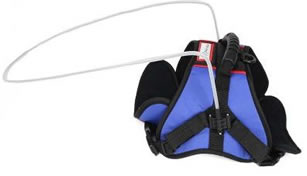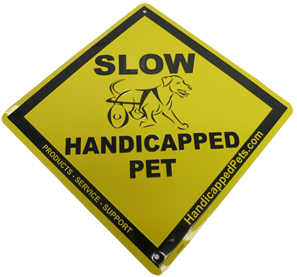Canine Blindness
Blind dogs get around just fine most of the time, thank you! There are many wonderful stories about how a sighted pet took a sightless pet under their care and became his 'seeing eye dog' (or cat or whatever). Those stories are heartwarming but how do blind dogs REALLY fare? If the idea of a blind pet seems daunting to you, I think you'll find this website helpful and uplifting.
Dogs can be blind for a lot of reasons....
Causes of Dog Blindness
- Severe or prolonged corneal diseases,
- Uveitis (infection),
- Cataracts which cause the eye lens to become opaque,
- Inflammation of the retina due to any infection,
- Detachment of the retina due to an injury,
- Elevated pressure inside of the eye for a long period of time (Glaucoma),
- Pressure on the optic nerve due to an injury or a disease,
- Impairment of the visual pathways,
- Diseased occipital cortex.
- Diabetes
- Entroption allowed to continue for a length of time (eyelashes rubbing on the eye).
- Seizures lasting too long or too often
Dog Blindness Signs and Symptoms
- Clumsiness and bumping into things. The dog may also appear to be disoriented.
- The dog is often unable to find its sleeping place, toys, food or water.
- The dog appears to be lazy and inattentive. It begins to sleep a lot more than usual.
- It gets easy to startle the dog. Even if the dog had a reputation of being ferocious, it starts to get scared easily.
- Little interest is show in any playful activity or outdoor exercise.
Some degenerative eyesight problems develope over a period of time such as cataracts or retina problems. Also medical ailments can cause blindness after a seizure, or canine diabetes so it's always important to have your pets general health checked to rule out diseases that could cause blindness.
Dog Blindness Treatments
Ideally, you'll be able to find a veterinary opthomologist. Hunting one down is well worth the added expense and time because they will be able to tell you exactly what is going on and if the vision impairment your dog is experiencing is permanent or something else. We had a dog once that was looking at the ground...after doing a bunch of internet research I was sure she had glacoma based on her symptoms but it wasn't! The opthomologist was able to determine she had meningitis just by looking in the eyes. Had we gone to the opthomologist sooner, rather than rely on our everyday vet, her diagnoses might have been sooner and saved her life. Never discount sudden vision problems - they can be indicators of something else. An ophthalmic examination is necessary to find an exact cause. A neurological examination of the dog is usually advised. Tests to rule out dog diabetes blindness is available.
Living with a Blind Dog
Getting to know that your dog can not see is the most devastating thing for any pet owner. Unfortunately we tend to attach too much to blindness, anthromorphizing how WE would feel without eyesight. But for most dogs, it's not that big a deal. A more insecure dog might find it a bit disconcerting, but most adjust eventually. They'll adjust to this situation just fine - compensating with their hearing and sense of smell most of the time. .
When a dog becomes blind gradually, it's often difficult to tell - unless they are in a new place, or have strangers in the house, or you change the furniture around a lot it can be almsot impossible to know. Sudden onset blindness however, will take some adjustment. Tethering can sometimes help in the adjustment, especially outdoors. A leash lets the dog know you are in control and will lead. Consistency is important too - don't do a lot of furniture moving in the house because each time you do, the dog may need time to become accustomed to the new layout. Ideally you'll want to keep things pretty much the same - where he eats, where he sleeps, and not too much clutter for him to navigate around. Dogs have some real advantages over people when it comes to blindness - they don't have to read, or drive, or prepare food using sharp knives - and with their excellent sense of smell, it's really not that big a disability.
For dogs that are temporarily or suddenly blind and tend to bump into things, a HALO is a good option giving them an extra layer of feeling - akin to the blind man using a cane. A dog that has always been blind, or becomes blind gradually seldom needs this extra layer of protection.

















